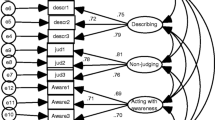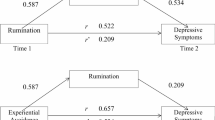Abstract
Although concurrent associations among dispositional mindfulness, rumination, and depression have been identified, lacking is a study that longitudinally examines the relationships among these three constructs in a non-clinical sample of adults. We specifically sought to determine whether rumination mediates the expected negative association between mindfulness and depressive symptoms across time. A community sample of 483 adults completed self-report measures of mindfulness, rumination, and depressive symptoms initially and after 3 months and after 6 months. The predicted cross-lag associations were found, i.e. mindfulness predicted diminished rumination, and rumination positively predicted depressive symptoms, and as a consequence, the predicted longitudinal mediation was supported in the data as well. At the facet level of mindfulness, three of the five facets (i.e. acting with awareness, non-judging, and non-reacting) exhibited the longitudinal mediation through rumination to depressive symptoms. The findings of this research suggest that certain aspects of mindfulness function to reduce rumination, which then predicts diminished depressive symptoms.


Similar content being viewed by others
References
Anderson, N. D., Lau, M. A., Segal, Z. V., & Bishop, S. R. (2007). Mindfulness-based stress reduction and attentional control. Clinical Psychology and Psychotherapy, 14, 449–463.
Andrade, L., Caraveo-Anduaga, J., Berglund, P., Bijl, R., Graaf, R., Vollebergh, W., & Wittchen, H. (2003). The epidemiology of major depressive episodes: Results from the International Consortium of Psychiatric Epidemiology (ICPE) surveys. International Journal of Methods in Psychiatric Research, 12(1), 3–21.
Arbuckle, J. (2009). AMOS 18 User’s Guide. Crawfordville: AMOS Development Corporation.
Baer, R. A. (2003). Mindfulness training as a clinical intervention: a conceptual and empirical review. Clinical Psychology: Science and Practice, 10(2), 125–143.
Baer, R. A., Smith, G. T., Hopkins, J., Krietemeyer, J., & Toney, L. (2006). Using self-report assessment methods to explore facets of mindfulness. Assessment, 13, 27–45.
Baer, R. A., Smith, G. T., Lykins, E., Button, D., Krietemeyer, J., Sauer, S., Walsh, E., Duggan, D., & Williams, M. G. (2008). Construct validity of the Five Facet Mindfulness Questionnaire in meditating and nonmeditating samples. Assessment, 15, 329–342.
Barnhofer, T., Crane, C., Hargus, E., Amarasinghe, M., Winder, R., & Williams, J. M. G. (2009). Mindfulness-based cognitive therapy as a treatment for chronic depression: a preliminary study. Behavior Research and Therapy, 47, 366–373.
Barnhofer, T., Duggan, D. S., & Griffith, J. W. (2011). Dispositional mindfulness moderates the relation between neuroticism and depressive symptoms. Personality and Individual Differences, 51, 958–962.
Beck, A., Steer, R., & Brown, G. (1996). Beck depression inventory (2nd ed.). San Antonio: The Psychological Corporation.
Borders, A., Earleywine, M., & Jajodia, A. (2010). Could mindfulness decrease anger, hostility, and aggression by decreasing rumination? Aggressive Behavior, 36, 28–44.
Bränström, R., Duncan, L. G., & Moskowitz, J. T. (2011). The association between dispositional mindfulness, psychological well-being, and perceived health in a Swedish population-based sample. British Journal of Health Psychology, 16, 300–316.
Bromet, E., Andrade, L. H., Hwang, I., Sampson, N. A., Alonso, J., De Girolamo, G., & Kessler, R. C. (2011). Cross-national epidemiology of DSM-IV major depressive episode. BMC Medicine, 9, 90.
Brown, K. W., & Ryan, R. M. (2003). The benefits of being present: Mindfulness and its role in psychological well-being. Journal of Personality and Social Psychology, 84, 822–848.
Bryant, F., & Yarnold, P. (1995). Principal components analysis and exploratory and confirmatory factor analysis. In L. G. Grimm & P. R. Yarnold (Eds.), Reading and understanding multivariate statistics (pp. 99–l37). Washington, DC: American Psychological Association.
Byrne, B., & van de Vijver, F. (2010). Testing for measurement and structural equivalence in large-scale cross-cultural studies: addressing the issue of nonequivalence. International Journal of Testing, 10(2), 107–132.
Cash, M., & Whittingham, K. (2010). What facets of mindfulness contribute to psychological well-being and depressive, anxious, and stress-related symptomatology? Mindfulness, 1, 177–182.
Cheung, G. W., & Rensvold, R. B. (2002). Evaluating goodness-of-fit indexes for testing measurement invariance. Structural Equation Modeling: A Multidisciplinary Journal, 9(2), 233–255. https://doi.org/10.1207/S15328007SEM0902_5.
Cooney, R. E., Joormann, J., Eugène, F., Dennis, E. L., & Gotlib, I. H. (2010). Neural correlates of rumination in depression. Cognitive, Affective, & Behavioral Neuroscience, 10, 470–478.
Desrosiers, A., Klemanski, D. H., & Nolen-Hoeksema, S. (2013a). Mapping mindfulness facets onto dimensions of anxiety and depression. Behavior Therapy, 44, 373–384.
Desrosiers, A., Vine, V., Klemanski, D. H., & Nolen-Hoeksema, S. (2013b). Mindfulness and emotion regulation in depression and anxiety: common and distinct mechanisms of action. Depression and Anxiety, 30, 654–661.
Deyo, M., Wilson, K. A., Ong, J., & Koopman, C. (2009). Mindfulness and rumination: does mindfulness training lead to reductions in ruminative thinking associated with depression? Explore, 5, 265–271.
Field, A. (2009). Discovering statistics using SPSS. London: SAGE.
Heeren, A., & Philippot, P. (2011). Changes in ruminative thinking mediate the clinical benefits of mindfulness: preliminary findings. Mindfulness, 2, 8–13.
Hofmann, S. G., Sawyer, A. T., Witt, A. A., & Oh, D. (2010). The effect of Mindfulness-Based Therapy on anxiety and depression: a meta-analytic review. Journal of Consulting and Clinical Psychology, 78, 169–183.
Hu, L., & Bentler, P. (1999). Cut-off criteria for fit indexes in covariance structure analysis: conventional criteria versus new alternatives. Structural Equation Modeling: A Multidisciplinary Journal, 6(1), 1–55.
Jose, P. E. (2013). Doing statistical mediation and moderation. New York: Guilford Press.
Jose, P. E. (2016). The merits of using longitudinal mediation. Educational Psychologist, 51, 331–341.
Kabat-Zinn, J. (1994). Wherever you go, there you are: Mindfulness meditation in everyday life. New York: Hyperion.
Kearns, N. P., Shawyer, F., Brooker, J. E., Graham, A. L., Enticott, J. C., Martin, P. R., & Meadows, G. N. (2016). Does rumination mediate the relationship between mindfulness and depressive relapse? Psychology and Psychotherapy: Theory, Research and Practice, 89, 33–49.
Keng, S., Smoski, M. J., & Robins, C. J. (2011). Effects of mindfulness on psychological health: a review of empirical studies. Clinical Psychology Review, 31, 1041–1056.
Kingston, T., Dooley, B., Bates, A., Lawlor, E., & Malone, K. (2007). Mindfulness-based cognitive therapy for residual depressive symptoms. Psychology and Psychotherapy: Theory, Research, and Practice, 80, 193–203.
Kline, R. B. (2005). Principles and practices of structural equation modeling (2nd ed.). New York: The Guilford Press.
Labelle, L. E., Campbell, T. S., & Carlson, L. E. (2010). Mindfulness-based stress reduction in oncology: evaluating mindfulness and rumination as mediators of change in depressive symptoms. Mindfulness, 1, 28–40.
Lyubomirsky, S., & Tkach, C. (2003). The consequences of dysphoric rumination. In C. Papageorgiou & A. Wells (Eds.), Depressive rumination, theory, and treatment. Chichester: Wiley.
Morrow, J., & Nolen-Hoeksema, S. (1990). Effects of responses to depression on the remediation of depressive affect. Journal of Personality and Social Psychology, 58, 519–527.
Muthén, B., & Curran, P. (1997). General longitudinal modeling of individual differences in experimental designs: a latent variable framework for analysis and power estimation. Psychological Methods, 2(4), 371–402.
Nolen-Hoeksema, S. (1991). Responses to depression and their effects on the duration of depressive episodes. Journal of Abnormal Psychology, 100, 569–582.
Nolen-Hoeksema, S. (2000). The role of rumination in depressive disorders and mixed anxiety/depressive symptoms. Journal of Abnormal Psychology, 109, 504–511.
Nolen-Hoeksema, S., Morrow, J., & Fredrickson, B. L. (1993). Response styles and the duration of episodes of depressed mood. Journal of Abnormal Psychology, 102, 20–28.
Ottaviani, C., & Couyoumdjian, C. (2013). Pros and cons of a wandering mind: a prospective study. Frontiers in Psychology, 4, 524. https://doi.org/10.3389/fpsyg.2013.00524.
Paul, N. A., Stanton, S. J., Greeson, J. M., Smoski, M. J., & Wang, L. (2013). Psychological and neural mechanisms of trait mindfulness in reducing depression vulnerability. Social Cognitive and Affective Neuroscience, 8, 56–64.
Petrocchi, N., & Ottaviani, C. (2016). Mindfulness facets distinctively predict depressive symptoms after two years: the mediating role of rumination. Personality and Individual Differences, 93, 92–96.
Raes, F. (2010). Rumination and worry as mediators of the relationship between self-compassion and depression and anxiety. Personality and Individual Differences, 48, 757–761.
Raes, F., & Williams, M. G. (2010). The relationship between mindfulness and uncontrollability of ruminative thinking. Mindfulness, 1, 199–203.
Ramel, W., Goldin, P. R., Carmona, P. E., & McQuaid, J. R. (2004). The effects of mindfulness meditation on cognitive processes and affect in patients with past depression. Cognitive Therapy and Research, 28, 433–455.
Raphiphatthana, B., Jose, P. E., & Kielpikowski, M. (2016). How do the facets of mindfulness predict the constructs of depression and anxiety as seen through the lens of the tripartite theory? Personality and Individual Differences, 93, 104–111.
Royuela-Colomer, E., & Calvete, E. (2016). Mindfulness facets and depression in adolescents: rumination as a mediator. Mindfulness, 7, 1092–1102.
Selby, E. A., Fehling, K. B., Panza, E. A., & Kranzler, A. (2016). Rumination, mindfulness, and borderline personality disorder symptoms. Mindfulness, 7, 228–235.
Shapiro, S. L., Schwartz, G. E., & Bonner, G. (1998). Effects of mindfulness-based stress reduction on medical and premedical students. Journal of Behavioral Medicine, 21, 581–599.
Spasojevic, J., & Alloy, L. B. (2001). Rumination as a common mechanism relating depressive risk factors to depression. Emotion, 1, 25–37.
Teasdale, J. D., Segal, Z., & Williams, M. G. (1995). How does cognitive therapy prevent depressive relapse and why should attentional control (mindfulness) training help? Behaviour Research and Therapy, 33, 25–39.
Thomsen, D. K. (2006). The association between rumination and negative affect: a review. Cognition and Emotion, 20(8), 1216–1235. https://doi.org/10.1080/02699930500473533.
Trochim, W. M., & Donnelly, J. P. (2006). The research methods knowledge base (3rd ed.). Cincinnati: Atomic Dog.
Vandenberg, R. J., & Lance, C. E. (2000). A review and synthesis of the measurement invariance literature: suggestions, practices, and recommendations for organizational research. Organizational Research Methods, 3(1), 4–70. https://doi.org/10.1177/109442810031002.
World Health Organization. (2017). Depression fact sheet. Page downloaded 6 December, 2017 from http://www.who.int/mediacentre/factsheets/fs369/e/
Acknowledgements
Appreciation is expressed to the Royal Society of New Zealand and its Marsden Fund for financially supporting the research reported here. We express thanks also to Bee Lim and the rest of the NZ Happiness Team for collecting the data, and to the participants of the study.
Funding
This project received funding from the Royal Society of New Zealand’s Marsden Fund (#06080611).
Author information
Authors and Affiliations
Contributions
TKJ: took the lead in data analysis and writing the manuscript. PEJ: designed and executed the study, assisted with the data analyses, and helped polish the manuscript.
Corresponding author
Ethics declarations
Conflict of Interest
The authors declare that they have no conflict of interest.
Ethical Approval
All procedures performed in studies involving human participants were in accordance with the ethical standards of the institutional and/or national research committee and with the 1964 Helsinki declaration and its later amendments or comparable ethical standards. Our ethics application was approved by the School of Psychology’s Human Ethics Committee of Victoria University of Welllington.
Informed Consent
Informed consent was obtained from all individual participants included in the study.
Additional information
Publisher’s Note
Springer Nature remains neutral with regard to jurisdictional claims in published maps and institutional affiliations.
Rights and permissions
About this article
Cite this article
Jury, T.K., Jose, P.E. Does Rumination Function as a Longitudinal Mediator Between Mindfulness and Depression?. Mindfulness 10, 1091–1104 (2019). https://doi.org/10.1007/s12671-018-1031-z
Published:
Issue Date:
DOI: https://doi.org/10.1007/s12671-018-1031-z




